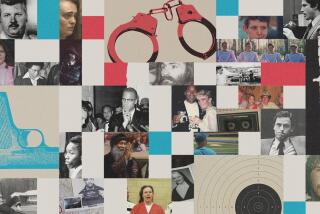HBO’s ‘Waldheim Inquiry’ Guilty of TV Tedium
- Share via
HBO’s ambitious “Waldheim: A Commission of Inquiry” must have seemed fascinating on paper.
Former German army officers, Allied prisoners of war and concentration camp survivors, among others, would testify before a distinguished panel of jurists in a hearing on charges that Austrian President Kurt Waldheim was implicated in war crimes as a young officer in the German army during World War II.
The ex-United Nations secretary-general’s alleged involvement, which he has denied, is a continuing hot topic that surely would attract interest. But this would be no hollow, exploitative exercise. Research would be exhaustive, involving 30 persons working in 19 countries examining thousands of pages of material bearing on the case.
And such credibility. The charges would be presented in a courtroom setting by Allan A. Ryan Jr., former director of the Office of Special Investigations, with responsibility for the Justice Department’s prosecution of Nazi war criminals in the United States.
Although Waldheim surely would not respond, former British Atty. Gen. Lord Peter Rawlinson would argue his defense. And Telford Taylor, America’s chief counsel for the prosecution during the Nuremberg trials, would be a special consultant.
Finally, the distinguished jurists would carefully weigh the evidence and, at the conclusion of the program, announce their decision. This would be historic, intriguing, suspenseful.
Yes, fascinating on paper.
But on the screen, at 8 p.m. Sunday, “Waldheim: A Commission of Inquiry” turns out to be an awesome and ponderous bore, at times barely watchable as it twists and winds through tedious, complex and monotonic testimony during 3 1/2 hours that pass like 3 1/2 years. An hour will be slashed from repeat airings later this month--not that it should make much difference.
If Waldheim is guilty, making him sit through this might be suitable punishment. Small portions of the testimony have impact, as when one former Allied POW recalls being horribly beaten during interrogation. And much further on, the closing arguments from Ryan and Rawlinson are eloquent and interesting.
However, because these are excerpts of an unscripted legal proceeding, albeit an unofficial one, there is no dramatic shape or center, and the testimony seems remote and almost unconnected. Simultaneous interpretation for non-English-speaking participants widens the gulf between the inquiry and the viewer. Hence, watching this is like arriving late for a movie and never catching up.
And dry? No wonder trials are almost always dramatized for television and not repeated or excerpted verbatim. Try this instead:
Rawlinson: So we have a division, corps, army.
Witness: That’s right.
Rawlinson: Now . . . yes?
Witness: If you seek to imply by that, (that) the division came under the command of the corps, I would have to disagree.
Rawlinson: How do you know they didn’t?
Witness: Because it’s quite clear from the documents that the division was reporting directly to the German general staff at Athens.
Actually, nothing in this Thames Television co-production is quite clear. Nor could it be.
The program is drawn from 40 hours of testimony in a London TV studio. So the judges’ decision (which was omitted from the preview tape furnished by HBO) is based on more than 11 times the amount of testimony available to Sunday’s viewers. Thus their decision--if anyone perseveres long enough to hear it--may be as abstract to viewers as what preceded it.
More to Read
The complete guide to home viewing
Get Screen Gab for everything about the TV shows and streaming movies everyone’s talking about.
You may occasionally receive promotional content from the Los Angeles Times.





